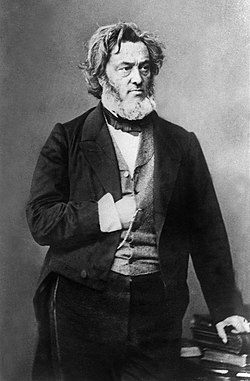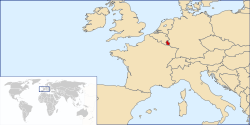
The causes of the Franco-Prussian War are deeply rooted in the events surrounding German unification. In the aftermath of the Austro-Prussian War (1866), Prussia had annexed numerous ethnically German territories and formed the North German Confederation with other German territories. Prussia then turned its attention towards the south of Germany, where it sought to expand its influence.
Contents
- European wars and the balance of power: 1865–1866
- Domestic agenda in France and Prussia
- French prestige and politics
- Bismarck and German nationalism
- Alliances and diplomacy
- German states
- Austria and Italy
- Russia
- United Kingdom
- Monarchial crises
- Luxembourg Crisis
- Spanish throne
- The Hohenzollern crisis and the Ems Dispatch
- European public reaction
- See also
- Notes
- References
- External links
France was strongly opposed to the annexation of the Southern German States (Bavaria, Wurttemberg, Baden and Hesse-Darmstadt) by the North German Confederation, which would have created too powerful a country next to its border. In Prussia, a war against France was deemed necessary to arouse German nationalism in those States in order to allow the unification of most German states (excluding the ethnically German lands of the Austrian Empire) into a great German empire. This aim was epitomized by Prussian Chancellor Otto von Bismarck's quote: "I knew that a Franco-Prussian War must take place before a united Germany was formed." [1] Bismarck also knew that France should be the aggressor in the conflict to bring the Southern German States to side with Prussia, hence giving Germans numerical superiority. [2]
The immediate cause of the war resided in the candidacy of a Prussian prince to the throne of Spain – France feared encirclement by an alliance between Prussia and Spain. The Hohenzollern prince's candidacy was withdrawn under French diplomatic pressure, but Otto von Bismarck goaded the French into declaring war by altering a dispatch sent by William I. Releasing the Ems Dispatch to the public, Bismarck made it sound as if the king had treated the French envoy in a demeaning fashion. Six days later, France declared war on Prussia and the Southern German States immediately sided with Prussia. [2]
French Emperor Napoleon III and Prime Minister Émile Ollivier's eagerness to relieve France from internal political convulsions also contributed to France's declaration of war on Prussia. [3]
In a book published in connection with a symposium held on the 150th anniversary of the Franco-Prussian War in 2020, Nicolas Bourguinat and Gilles Vogt, co-organisers of the symposium, point out that most French historians now cast into doubt the three-point official version regarding the causes of the war that has dominated French historiography for a long time: 1) that Bismark needed a war to bring Southern Germany behind Prussia in order to complete German unification; 2) that Bismarck lured France into a trap in connection with a candidacy to the Spanish throne; 3) that the French government, pressured by public opinion and convinced of its military superiority, fell head-on into the trap. [4] The authors stress that with the benefit of hindsight it is now difficult to support the thesis that the Hohenzollern candidacy had been a ploy destined to draw France into an armed conflict. [5] Regardless of what might have been Bismarck’s ulterior motives with respect to the Hohenzollern candidacy, Paris, intent on war, had decided early on to use that candidacy as a casus belli. [6]






